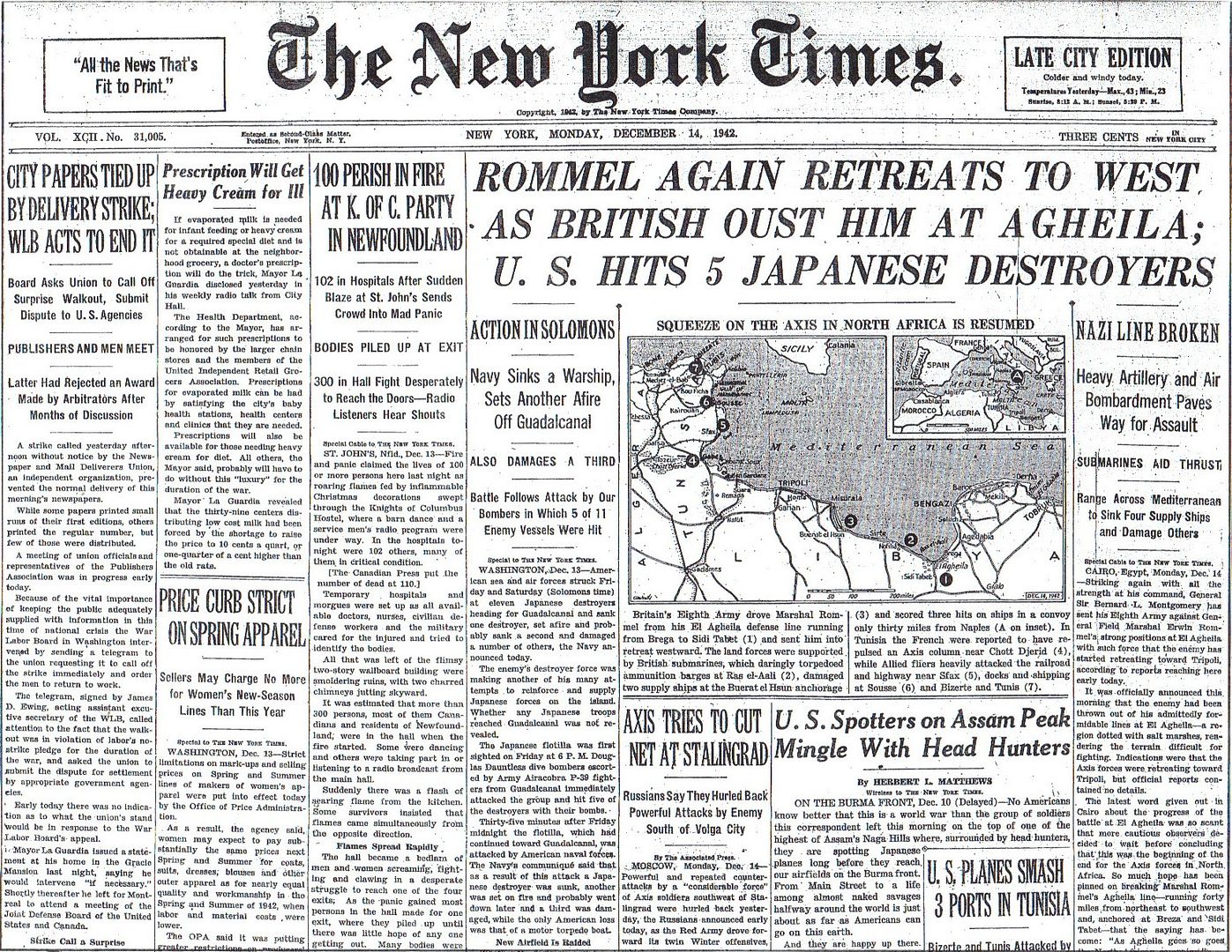
Posted on 12/14/2012 4:13:52 AM PST by Homer_J_Simpson

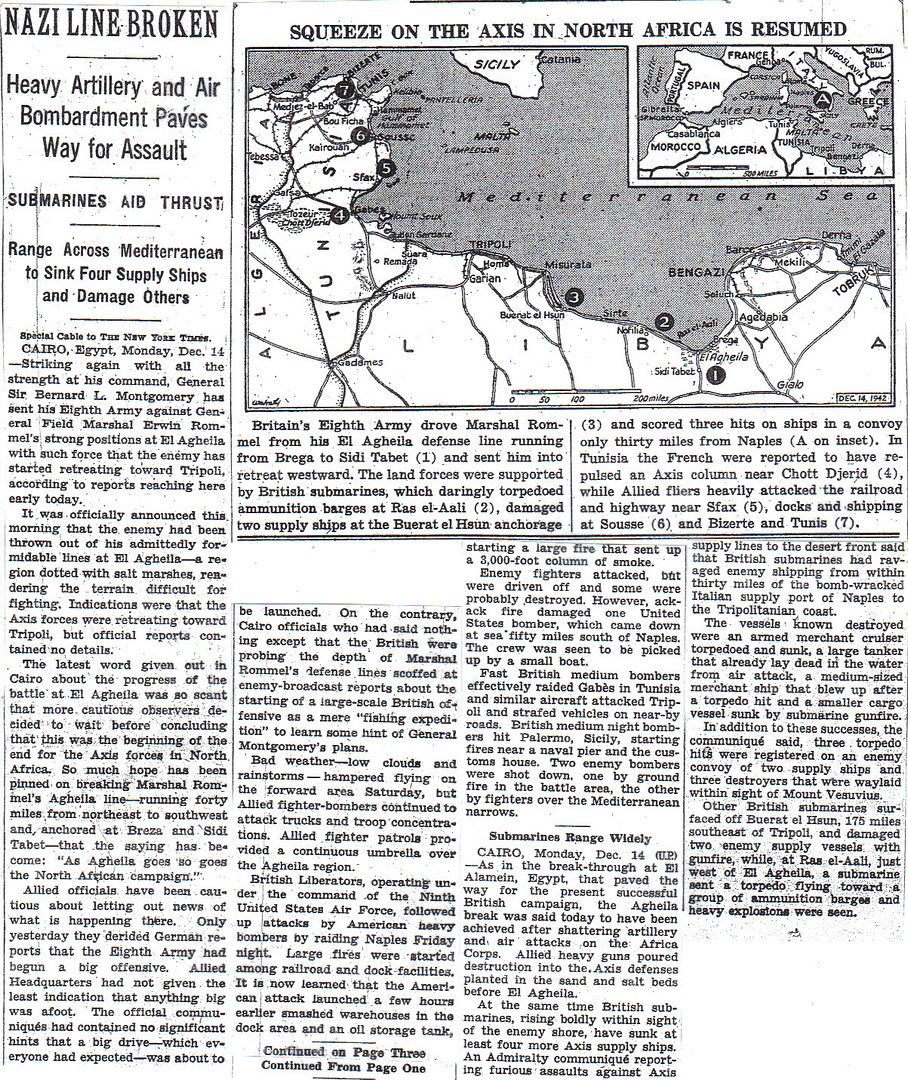
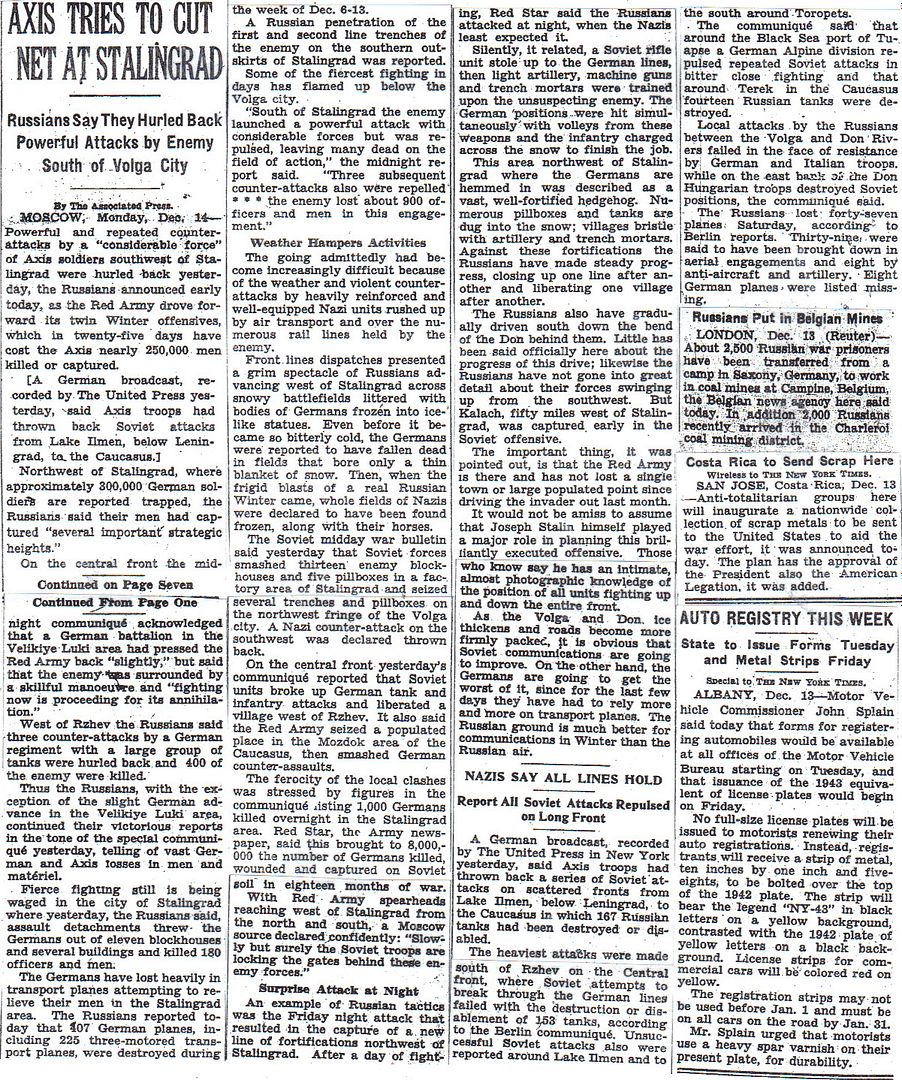
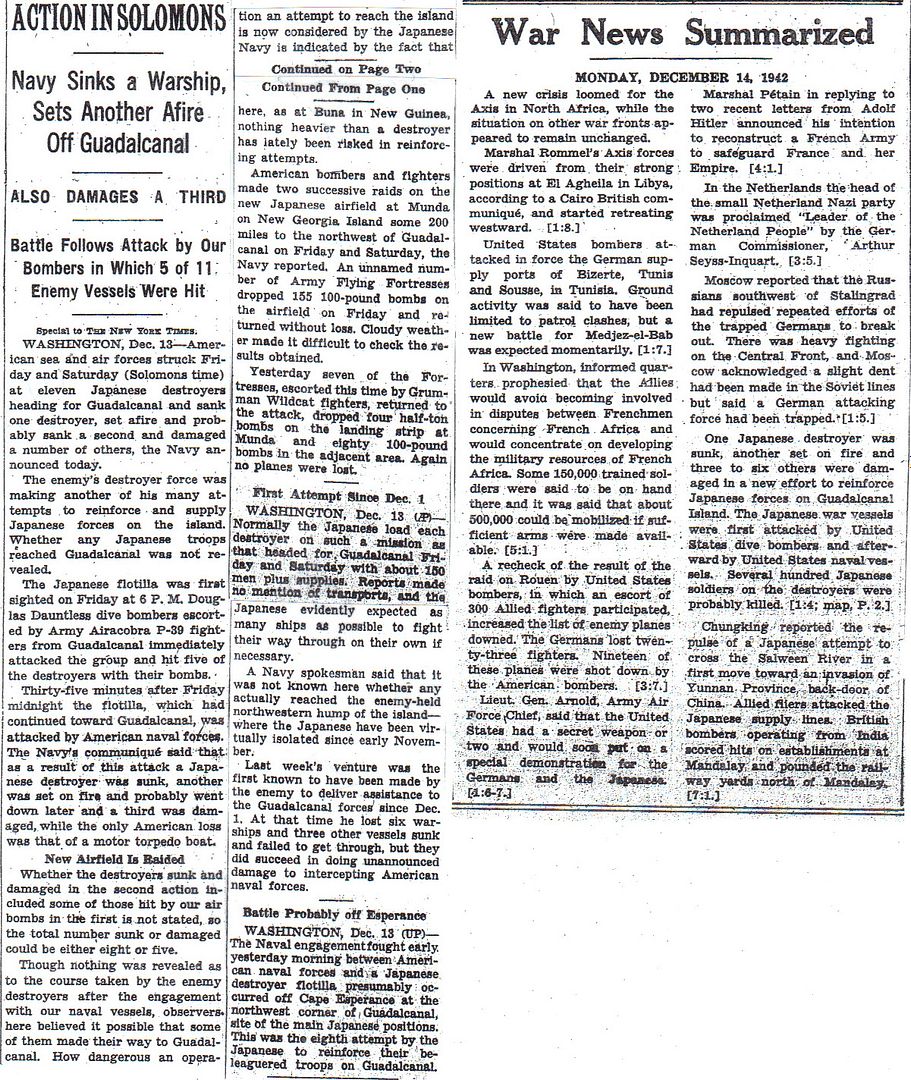
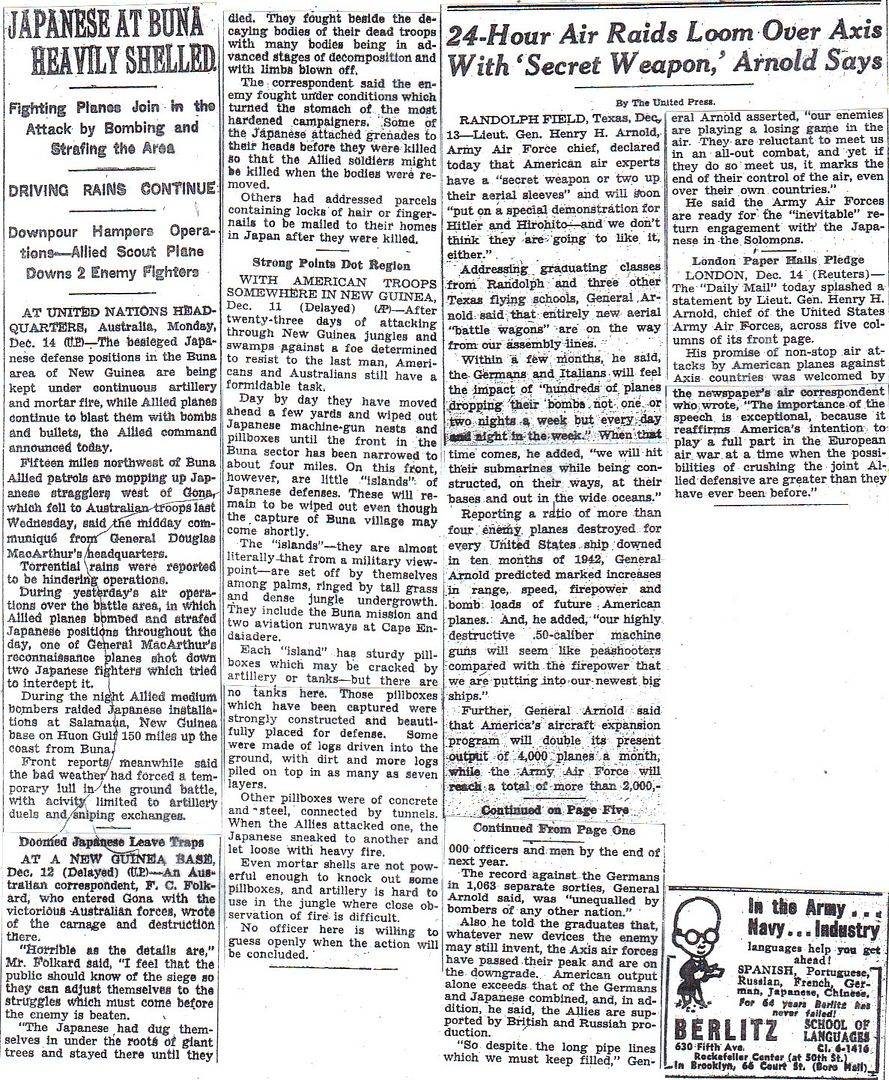
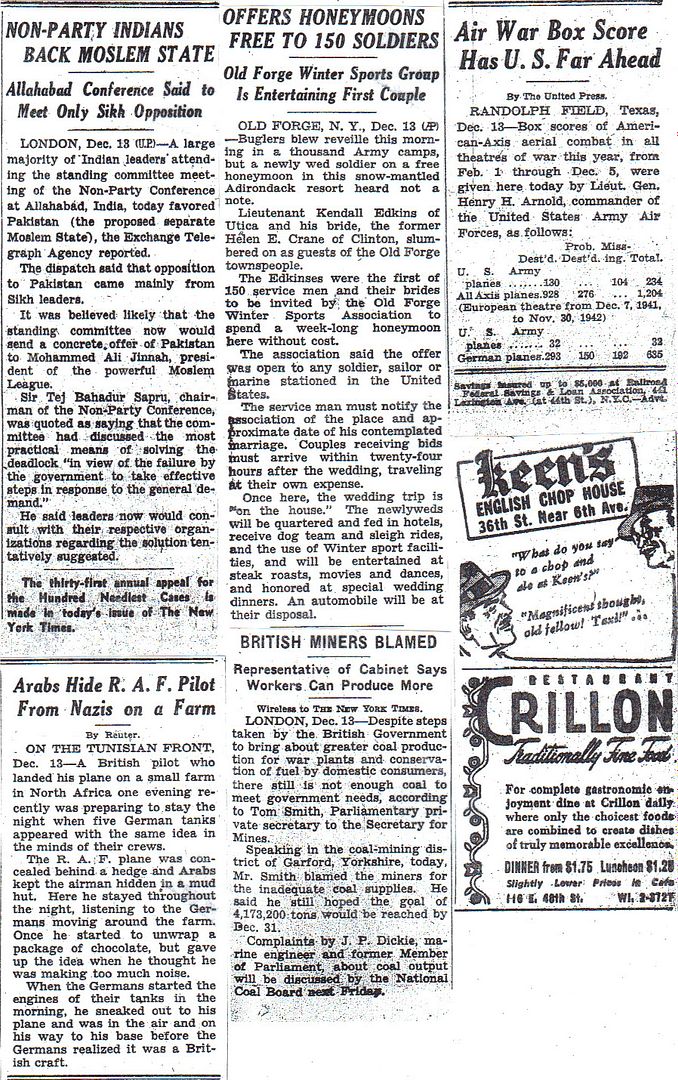
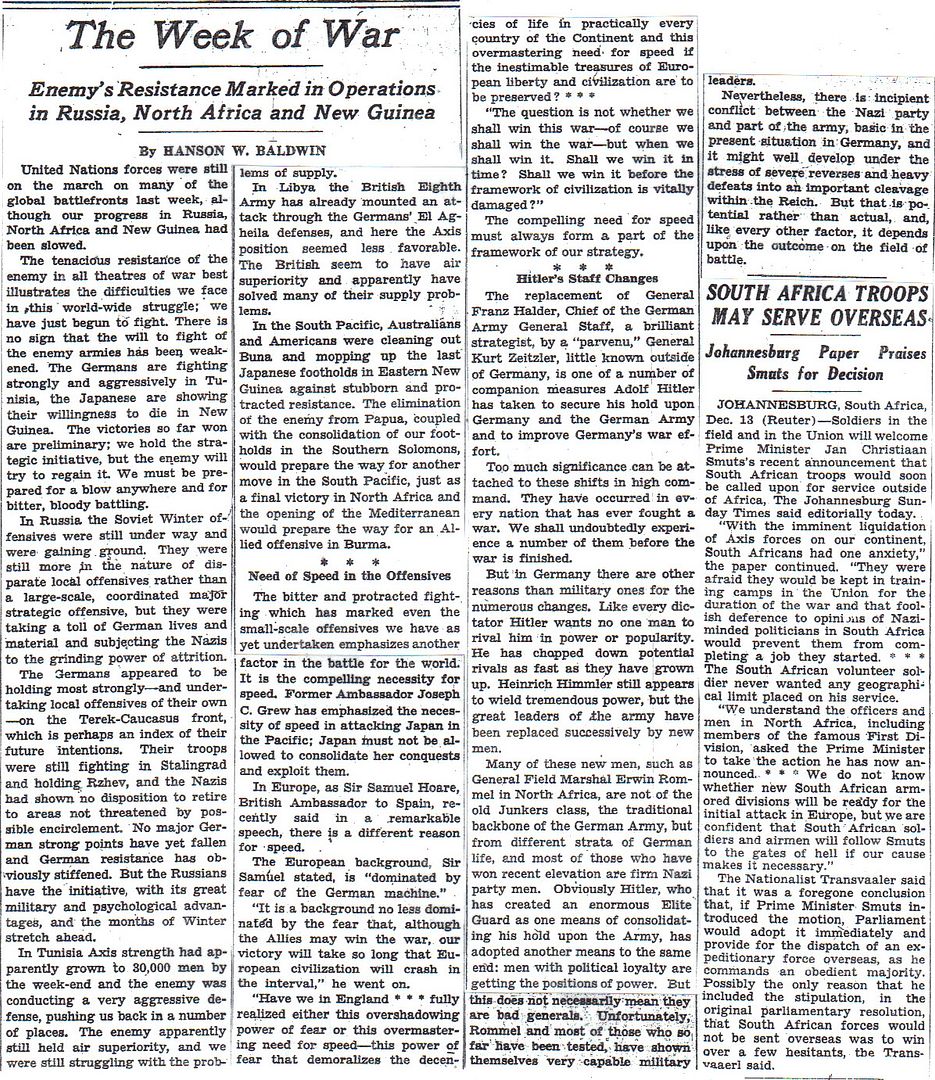
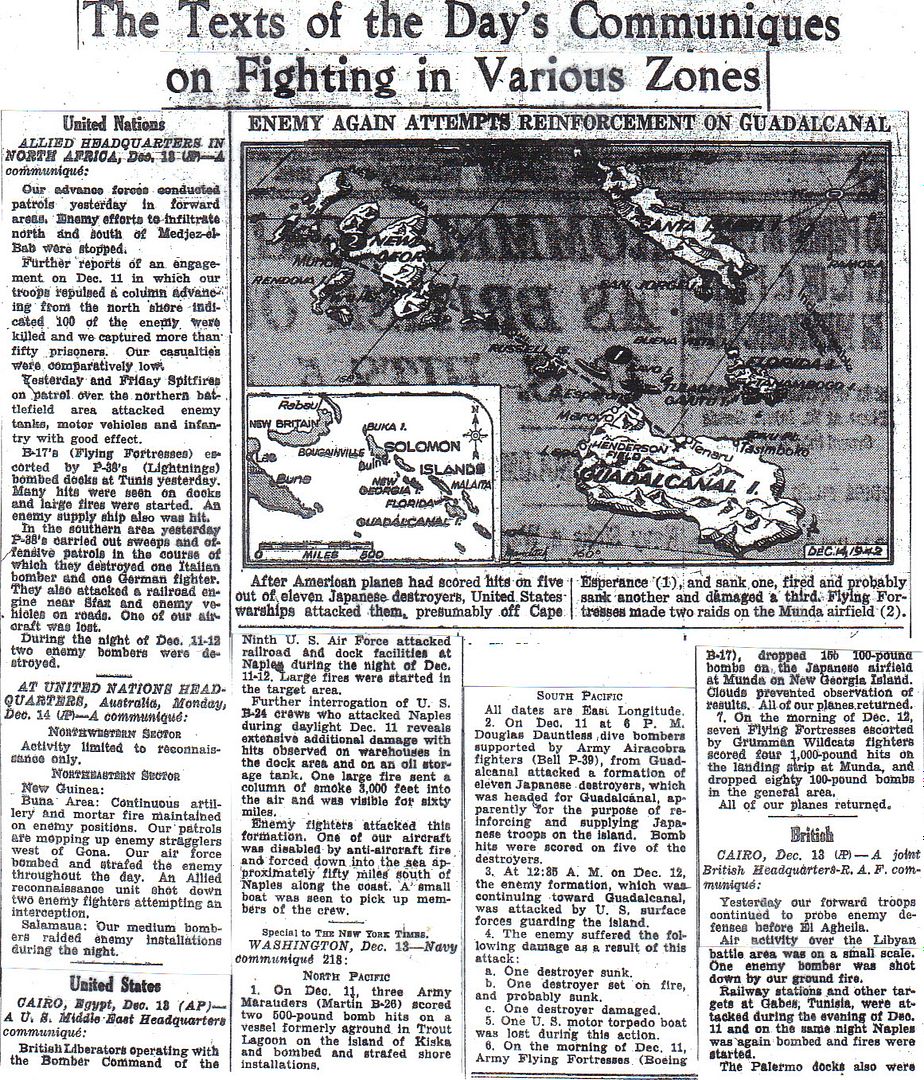
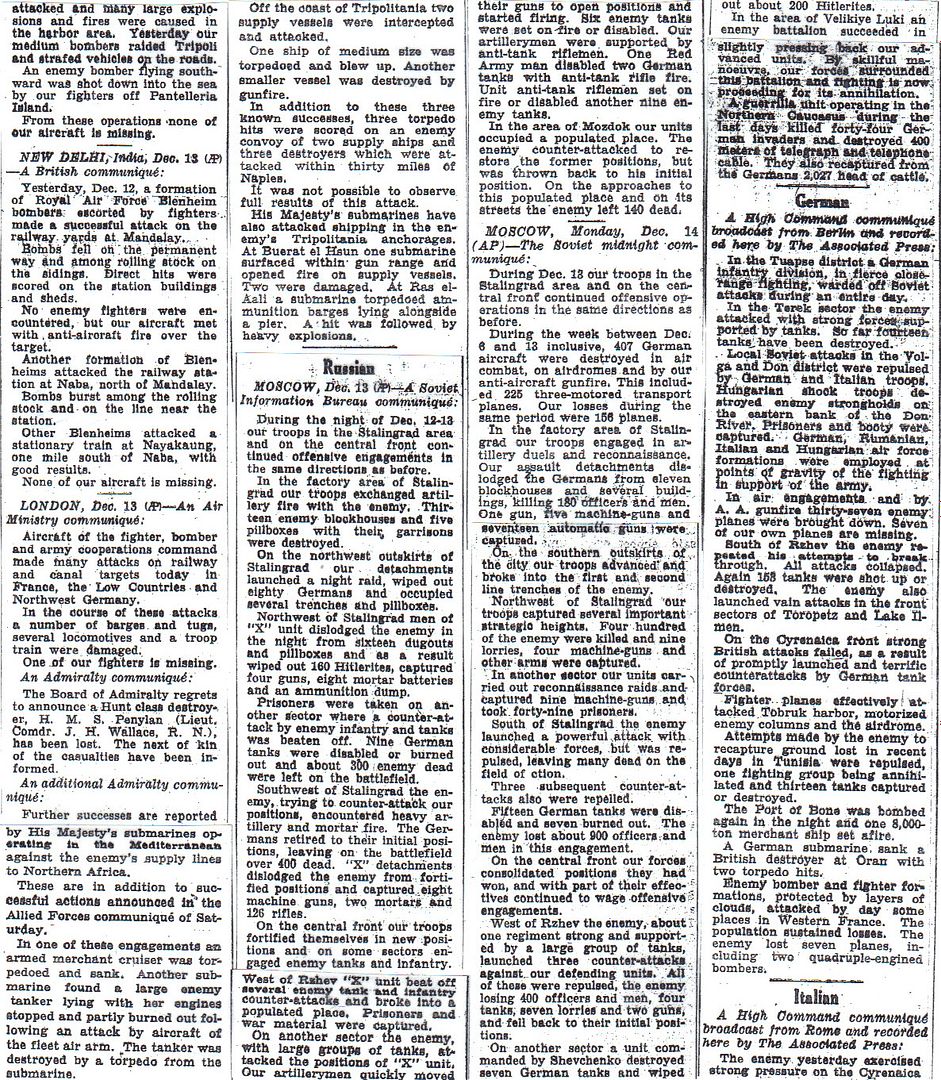
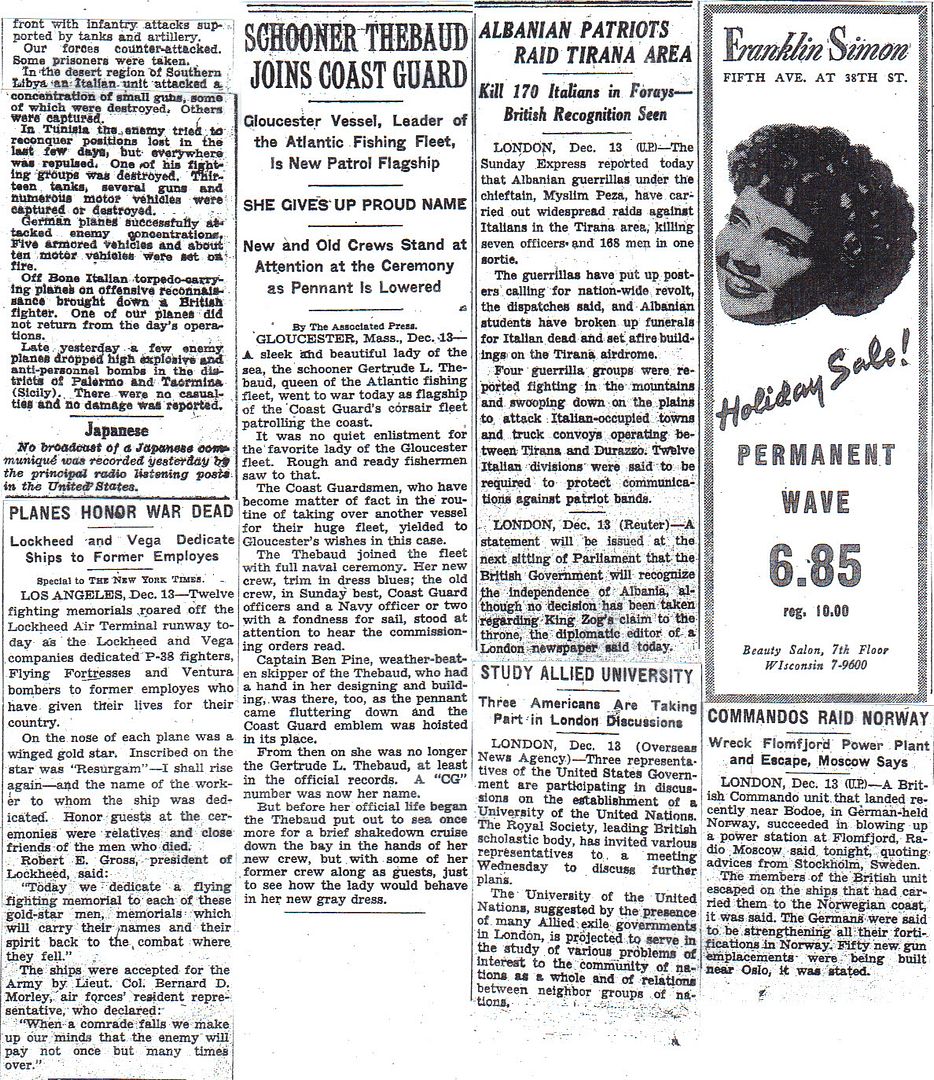
Three pings to the list today. A new record.
http://www.onwar.com/chrono/1942/dec42/f13dec42.htm
Axis retreat in the desert
Sunday, December 13, 1942 www.onwar.com
In North Africa... Libya, The British 8th Army captures Mersa Brega. Rommel begins to withdraw from the El Agheila position.
Over Tunisia... US air forces stage heavy raids on Bizerta and Tunis.
That was yesterday’s entry. Sorry.
http://www.onwar.com/chrono/1942/dec42/f14dec42.htm
180 tons of supplies delivered to Stalingrad
Monday, December 14, 1942 www.onwar.com
Supplies being loaded for the trapped German 6th Army [photo at link]
On the Eastern Front... Manstein’s relieving attack toward Stalingrad is still making good progress. The Luftwaffe manages to drop 180 tons of supplies to the trapped army, the largest single amount to be dropped on any day until the army’s surrender.
In North Africa... Libya, The German position at the El Agheila line is attacked by 7th Armored Division. The New Zealanders attempt an outflanking maneuver.
In New Guinea... Japanese reinforcement land about 30 miles west of Gona and begin marching toward the Australian flank. In Buna, the American’s take the village, but the Japanese still hold the well fortified Government Station.
On Madagascar... British Foreign Minister Anthony Eden and Free French Leader de Gaulle agree that the administration of the captured French colony should be done by the Free French. General Gentilhomme is appointed High Commissioner.
http://homepage.ntlworld.com/andrew.etherington/frame.htm
December 14th, 1942
UNITED KINGDOM: Westminster: Churchill asks Anthony Eden, his foreign secretary, whether reports about “the wholesale massacre of Jews” by “electrical methods” are true.
Eden tells him that “Jews are being withdrawn from Norway and sent to Poland, for some such purposes evidently.” Eden, is, however, unable to “confirm the method” of killing.
2/8 Btn. Lancashire Fusiliers are moved to Ballynahinch, Northern Ireland. Their main function will be to train alongside and with the newly arrived United States troops. (119)
The Combined Production and Resources Board and the Combined Raw Materials Board issued a statement simultaneously in Washington and London, that the United Kingdom, the United States, and Canada had united in creating a Combined Steel Committee “to squeeze every possible ton of steel out of existing plant facilities, in order to fulfill the combined war production program for 1943” .
Minesweeper HMS Thisbe laid down.
Submarine HMS Vigorous laid down.
Sloop HMS Woodpecker commissioned.
(Dave Shirlaw)
U.S.S.R.: Goering’s airlift to Stalingrad brings in 180 tons. This is the largest effort to date and will not be exceeded. The German relief column is making progress in their advance.
NORTH AFRICA: The British 7th Armoured division attacks the El Agheila line while the New Zealanders try to outflank it.
El Agheila: The trap was carefully laid for Rommel - but, once again, the wily Desert Fox has succeeded in getting away from Montgomery’s Eighth Army. The Panzerarmee Afrika (as the Afrika Korps is now known) has slipped away from this port where Rommel began his desert campaigns and is now heading west for Tripoli and Tunisia. The 2nd New Zealand Division was encircling the town in preparation for a planned frontal assault due to begin today. But under cover of dusk two nights ago Rommel’s Panzers began to escape, their commander now hoping to link up with the other Axis forces in Tunisia.
ABYSSINIA: The Government of Abyssinia proclaimed that a state of war existed between Abyssinia and Germany, Italy, and Japan. (Dave Shirlaw)
MADAGASCAR: Eden and DeGaulle agree that the Free French should administer Madagascar. Free French High Commissioner General Paul Legentilhomme is appointed.
NEW GUINEA: The Japanese use a seaborne landing 30 miles west of Gona to outflank the Australians.
U.S.A.: Destroyer escorts USS Bull and Farquhar laid down.
Light cruiser USS Wilkes-Barre laid down. (Dave Shirlaw)
ATLANTIC OCEAN:
After serious trouble with the periscope, U-575 had to return from a patrol in the North Atlantic.
U-105 sank SS Orfor.
U-177 sank SS Sawahloento.
U-217 sank SS Etna.
U-443 sank SS Edencrag in Convoy TE-9. (Dave Shirlaw)
img src="http://farm8.staticflickr.com/7051/6962543353_3b78569da6_z.jpg">
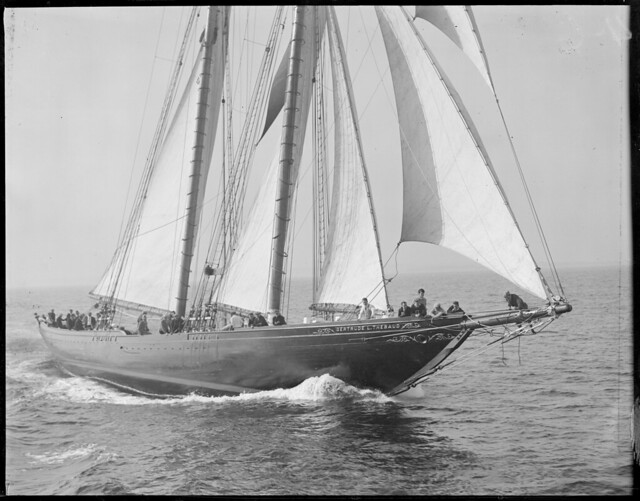
ON 12th December Hoth launched his attack.
The task facing this experienced, resourceful, and bold tank commander was difficult but not hopeless.
Hoth's right flank had been secured, like the line on the Chir, by drastic means. Colonel Doerr, who was Chief of the German Liaison Staff with the shattered Rumanian Fourth Army, had built up a thin covering line with ad hoc units and scraped-together parts of German mobile formations, in much the same way as Colonel Wenck had done in the north.
The combat groups under Major Sauvant with units of 14th Panzer Division, and under Colonel von Pannwitz with his Cossacks, flak units, and ad hoc formations, restored some measure of order among the retreating Rumanian troops and the German rearward services to whom the panic had finally set in.
The 16th Infantry Division (mot) retreated from the vast wastes of the Kalmyk steppe to prepared positions.
In this way it also proved possible on the southern wing to foil Russian attempts to strike from the east at the rear of the Army Group Caucasus and to cut it off.
One would have thought that Hitler would now have made available whatever forces he could for Hoth's relief attack, to enable him to strike his liberating blow across the 60 miles of enemy territory with the greatest possible vigor and speed. But Hitler was again stingy with his formations.
With the exception of 23rd Panzer Division, which was coming up under its own steam, he did not release any of the forces in the Caucasus. The only fully effective formation allocated to Hoth was General Raus's experienced 6th Panzer Division with 160 tanks, which had to be brought from France. It arrived on 12th December with 136 tanks. The 23rd Panzer Division arrived with 96 tanks.
Sixty miles was the distance Hoth had to cover—60 miles of strongly held enemy territory.
But things started well.
Almost effortlessly the 11th Panzer Regiment, 6th Panzer Division, under its commander Colonel von Hunersdorff on the very first day dislodged the Soviets, who fell back to the east. The Russians abandoned the southern bank of the Aksai, and Lieutenant-Colonel von Heydebreck established a bridgehead across the river with units of 23rd Panzer Division.
The Soviets were taken by surprise.
Colonel-General Yeremenko telephoned Stalin and reported anxiously: "There is a danger that Hoth may strike at the rear of our Fifty-seventh Army which is sealing off the south-western edge of the Stalingrad pocket. If, at the same time, Paulus attacks from inside the pocket, towards the south-west, it will be difficult to prevent him from breaking out."
Stalin was angry.
"You will hold out—we are getting reserves down to you," he commanded menacingly. "I'm sending you the Second Guards Army—the best unit I've left."
But until the Guards arrived Yeremenko had to manage alone.
From his ring around Stalingrad he pulled out the XIII Armored Corps and flung it across the path of Hoth's 6th Panzer Division. He also ruthlessly denuded his Army Group of its last reserves and threw in the 235th Tank Brigade and the 87th Rifle Division against the spearheads of Hoth's attack.
Fighting for the high ground north of the Aksai went on for five days. Fortunately for Hoth, the 17th Panzer Division, which Hitler had at last made available, arrived just in time. Consequently the enemy was dislodged on 19th December.
After a memorable all-night march the armored group of 6th Panzer Division reached the Mishkova sector at Vasilyevka in the early morning of 20th December. But Stalin's Second Guards Army was there already. Nevertheless General Raus's formations succeeded in establishing a bridgehead two miles deep.
Only 30 to 35 miles as the crow flew divided Hoth's spearheads from the outposts of the Stalingrad front.
What meanwhile was the situation like inside the pocket?
The supply position of the roughly 230,000 German and German allied troops was pitiful.
It soon turned out that the German Luftwaffe was in no position to keep a whole Army in the depth of Russia supplied from temporary air-strips in mid-winter. There were not enough transport aircraft. Bombers had to do service as transport machines. But these could not carry more than a few tons of cargo. Moreover, their withdrawal from operational flying had unpleasant consequences in all sectors of the front.
Once again the crucial problem of the campaign was clearly revealed:
Germany's material strength was insufficient for this war.
General von Seydlitz had put the daily supply requirements at 1000 tons.
That was certainly too high.
Sixth Army regarded 600 tons as desirable and 300 tons as the minimum figure for keeping the Army in some sort of fighting condition. Bread requirements alone for the defenders in the pocket amounted to forty tons a day.
Fourth Air Fleet tried to fly in these 300 tons a day. Lieutenant-General Fiebig, the experienced Commander of VIII Air Corps, was assigned this difficult task—and at first it looked as though it could be accomplished. Soon, however, frost and bad weather proved insuperable enemies, more dangerous than Soviet fighters or the Soviet heavy flak. Icing up, poor visibility, and the resulting accidents caused more casualties than enemy action.
Nevertheless the air crews displayed a dash and gallantry as in no previous operation. Never before in the history of flying had men set out with such disdain of death and such firm resolution as for the supply airlift to Stalingrad.
Some 550 aircraft were totally lost.
That means that one-third of the aircraft employed were lost together with their crews—the victims of bad weather, fighters, and flak. One machine in every three was lost—a terrifying rate which no air power in the world could have kept up.
Only on two occasions was the minimum cargo of 300 tons delivered—or very nearly so. On 7th December, according to the diary of the Chief Quartermaster of Sixth Army, 188 aircraft landed at the airfield of Pitomnik and delivered 282 tons.
On 20th December the figure was 291 tons. According to Major-General Herhudt von Rohden's excellent essay, based on the records of the Luftwaffe, the peak day of the airlift was 19th December, when 154 aircraft delivered 289 tons of supplies to Pitomnik and evacuated 1000 wounded.
On an average, however, the daily deliveries between 25th November and 11th January totaled 104-7 tons.
During that period a total of 24,910 wounded were evacuated. At this rate of supplies the men in the pocket had to go hungry and were seriously short of ammunition.
Nevertheless the divisions held out.
To this day the Soviets have not published any definite figures of German deserters. But according to all available German sources their number, until mid-January, must have been negligible.
Indeed, as soon as the news spread among the troops that Hoth's divisions had launched their relief attack a real fighting spirit spread among them.
There was hardly a trooper or an officer who was not firmly convinced that Manstein would get them out. And even the most battle-weary battalion felt strong enough to strike at the ring of encirclement to meet their liberators half-way. That such a plan existed was generally known inside the pocket. After all, units of two motorized divisions and one Panzer division were standing by on the southern front of the pocket, ready to strike in the direction of Hoth's divisions the moment these were close enough and the order for " Winter Storm " was given.
The afternoon of 19th December was cold but clear—magnificent flying weather. Over Pitomnik there was a continuous roar of transport aircraft. They touched down and unloaded their cargoes, were packed full with wounded, and took off again. Petrol-drums were piled high, packing-cases were stacked on top of one another. Shells were trundled away. If only they had this kind of weather every day!
Twenty-four hours earlier an emissary from Manstein had arrived in the pocket in order to acquaint the Army with the Field-Marshal's ideas about the break-out.
Major Eismann, the Intelligence Officer of Army Group Don, had meanwhile flown back again.
No one suspected as yet that his visit was to become an irritating episode in the Stalingrad tragedy— simply because no written record is extant of the conversations, and the account written by the major from memory ten years later has given rise to many conflicting thesis. To this day it has not been definitely established what Paulus, Schmidt, and Eismann really said and what they meant.
Did Eismann convey clearly and accurately Manstein's view that the present situation offered only the brutal alternative of early break-out or annihilation?
Did he convey clearly that Hollidt's group on the Chir was so busy defending itself against Soviet counter-attacks that there could be no question of its launching an attack in support of Hoth?
Did he report that ever-stronger Soviet formations were being deployed against Hoth?
Above all, did he state unambiguously that the Field-Marshal was entirely clear about one thing—that the break-out demanded the surrender of Stalingrad in several stages, no matter what label was given to the operation, in order not to arouse Hitler's suspicions too soon?
And what did Paulus and Schmidt say in reply? Questions and more questions—and none of them capable of being answered now, Eismann's mission is likely to engage the attention of military historians for a long time yet.
The 19th December might be called the day of decision, the day when the drama of Stalingrad reached its culmination.
Paulus and his chief of staff, Major-General Schmidt, were standing in the dugout of the Army chief of operations, in front of a teleprinter which had been connected to a decimeter-wave instrument, a radio circuit which could not be monitored by the Soviets. In this way Sixth Army had an invaluable, even though technically somewhat cumbersome, direct line to Army Group Don in Novocherkassk.
Paulus was waiting for the arranged contact with Manstein. Now the time had come. The machine started ticking. It wrote:
" Are the gentlemen present?"
Paulus ordered the reply to be sent:
" Yes." "Will you please comment briefly on Eismann's report," came the message from Manstein.
Paulus formulated his comment concisely.
Alternative 1: Break-out from pocket in order to link up with Hoth is possible only with tanks. Infantry strength lacking. For this alternative all armored reserves hitherto used for clearing up enemy penetrations must leave the fortress.
Alternative 2: Break-out without link-up with Hoth is possible only in extreme emergency. This would result in heavy losses of material. Prerequisite is preliminary flying-in of sufficient food and fuel to improve condition of troops. If Hoth could establish temporary link-up and bring in towing vehicles this alternative would be easier to carry out. Infantry divisions are almost immobilized at moment and are getting more so every day as horses are slaughtered to feed men.
Alternative 3: Further holding out in present situation depends on aerial supplies on sufficient scale. Present scale utterly inadequate.
And then Paulus dictated into the teleprinter:
"Further holding out on present basis not possible much longer."
The teleprinter tapped three crosses.
A moment later Manstein's text came ticking through:
"When at the earliest could you start Alternative 2?"
Paulus answered:
"Time needed for preparation three to four days."
Manstein asked:
"How much fuel and food required?"
Paulus replied:
"Reduced rations for ten days for 270,000 men."
The conversation was interrupted. A quarter of an hour later, at 1830 hours, it was resumed, and Manstein and Paulus once more talked to each other through the keyboards of their teleprinters. In a strangely anonymous way the words appeared, clicking, on the paper:
"Colonel-General Paulus here, Herr Feldmarschall."
"Good evening, Paulus."
Manstein reported that Hoth's relief attack with General Kirchner's LVII Panzer Corps had got as far as the Mishkova river.
Paulus in turn reported that the enemy had attacked his forces concentrated for a possible break-out at the southwestern corner of the pocket.
Manstein said:
Stand by to receive an order
A few minutes later the order came clicking over the teleprinter. This is what it said:
Order!
To Sixth Army
(1) Fourth Panzer Army has defeated the enemy in the Verkhne-Kumskiy area with LVII Panzer Corps and reached the Mishkova sector. An attack has been initiated against a strong enemy group in the Kamenka area and north of it. Heavy fighting is to be expected there. The situation on the Chir front does not permit the advance of forces west of the Don towards Stalingrad. The Don bridge at Chirskaya is in enemy hands.
(2) Sixth Army will launch attack "Winter Storm" as soon as possible. Measures must be taken to establish link-up with LVII Panzer Corps if necessary across the Donskaya Tsaritsa in order to get a convoy through
(3) Development of the situation may make it imperative to extend instruction for Army to break through to LVII Panzer Corps as far as the Mishkova, Code name: "Thunderclap." In that case the main task will again be the quickest possible establishment of contact, by means of tanks, with LVII Panzer Corps with a view to getting convoy through. The Army, its flanks having been covered along the lower Karpovka and the Chervlenaya, must then be moved forward towards the Mishkova while the fortress area is evacuated section by section
Operation "Thunder-clap" may have to follow directly on attack "Winter Storm." Aerial supplies will, on the whole, have to be brought in currently, without major build-up of stores. Airfield of Pitomnik must be held as long as possible
All arms and artillery that can be moved at all to be taken along, especially the guns needed for the operation, and to be ammunitioned, but also such weapons and equipment as are difficult to replace. These must be concentrated in the southwestern part of the pocket in good time
(4) Preparations to be made for (3). Putting into effect only upon express order "Thunder-clap
(5) Report day and time of attack
It was an historic document. The great moment had come. The Army was to assemble for its march into freedom. For the moment, however, only "Winter Storm" was in force— i.e., a corridor was to be cleared to Hoth's divisions, but Stalingrad was not to be evacuated for the time being.
During the afternoon Manstein had again tried to obtain Hitler's consent to an immediate total break-out by Sixth Army, to Operation "Thunder-clap." But Hitler only approved "Winter Storm," while refusing his consent to the major solution. Nevertheless Manstein, as this document reveals, issued orders to Sixth Army to prepare for "Thunder-clap," and explicitly stated under (3): "Development of the situation may make it imperative to extend instruction for Army to break through."
To extend it, that is, into a break-out.
The drama had reached its climax. The fate of a quarter million troops depended on two code names— "Winter Storm" and "Thunder-clap"
At 2030 hours the two chiefs of staff were again sitting in front of their teleprinters. General Schmidt reported that enemy attacks were engaging the bulk of Sixth Army's tanks and part of its infantry strength. Schmidt added: "Only when these forces have ceased to be tied down in defensive fighting can a break-out be launched. Earliest date 22nd December." That was three days ahead.
It was an icy night.
In the bunkers at Gumrak there was feverish activity. On the following morning at 0700 hours Paulus was already on his way to the crisis points of the pocket. Throughout the day there was local fighting in many sectors. In the afternoon, when the two chiefs of staff, Schultz and Schmidt, had another conversation over the teleprinters, Schmidt reported: "As a result of losses during the past few days manpower situation on the western front and in Stalingrad exceedingly tight.
Penetrations can be cleared up only by drawing upon the forces earmarked for 'Winter Storm.'
In the event of major penetrations, let alone breakthroughs, our Army reserves, in particular the tanks, have to be employed if the fortress is to be held at all. The situation could be viewed somewhat differently," Schmidt added, "if it were certain that 'Winter Storm' will be followed immediately by 'Thunderclap.' In that event local penetrations on the remaining fronts could be accepted provided they did not jeopardize the withdrawal of the Army as a whole. In that event we could be considerably stronger for a break-out towards the south, as we could then concentrate in the south numerous local reserves from all fronts."
It was a vicious circle, a problem that could be solved only if permission for "Thunder-clap" was obtained.
General Schultz replied, unfortunately through the medium of the teleprinter so that the imploring note in his voice was lost, as he dictated to his clerk:
"Dear Schmidt, the Field-Marshal believes that Sixth Army must launch 'Winter Storm' as soon as possible. You cannot wait until Hoth has got to Buzinovka. We fully realize that your attacking strength for 'Winter Storm' will be limited. That is why the Field-Marshal is trying to get approval for 'Thunder-clap.' The struggle for this approval has not yet been decided at Army High Command in spite of our continuous urging. But regardless of the decision on 'Thunder-clap' the Field-Marshal emphatically points out that 'Winter Storm' must be started as soon as possible.
As for fuel supplies, food-stuffs, and ammunition, over 3000 tons of stores loaded on columns are already standing behind Hoth's Army and will be ferried through to you the moment the link-up has been established. Together with this cargo column numerous towing vehicles will be sent to you in order to make your artillery mobile. Moreover, thirty buses are standing by to evacuate your wounded."
Thirty buses! Nothing, evidently, had been forgotten. And all that stood between Sixth Army and salvation was 30 miles as the crow flew, or 40 to 45 miles by road.
At that moment, right in the middle of these considerations and calculations, planning and preparations, a new disaster befell the German front in the East:
three Soviet Armies had launched an attack against the Italian Eighth Army on the middle Don on 16th December. Once again the Russians had chosen a sector held by the weak troops of one of Germany's allies.
After short savage fighting the Soviets broke through.
The Italians fled. The Russians raced on to the south.
One Tank Army and two Guards Armies flung themselves against the laboriously established weak German line along the Chir. If the Russians succeeded in overrunning the German front on the Chir there would be nothing to halt them all the way to Rostov.
And if the Russians took Rostov, then Manstein's Army Group Don would be cut off and von Kleist's Army Group in the Caucasus would be severed from its rearward communications. It would be a super-Stalingrad.
What would be at stake then was no longer the fate of 200,000 to 300,000 men, but a million and a half.
On 23rd December, while the men of Sixth Army were still hopefully awaiting their liberators, enemy armored spearheads were already striking down from the north towards the airfield of Morozovsk, 95 miles west of Stalingrad, on which the surrounded Army's entire supplies depended. The disastrous situation was thus plain.
Hollidt's group on the Chir no longer had any flank cover.
In this situation Manstein had no other choice than to order Hoth to switch one of his three Panzer divisions immediately to the left, to the lower Chir, in order to forestall a further breakthrough by the Russians. Hoth did not hesitate, and made his strongest unit available for this vital task.
The 6th Panzer Division was in the middle of its attack in the direction of Stalingrad when the order to turn away reached it.
Left with only two battle-weary divisions, Hoth now found it impossible to continue his attack towards Stalingrad.
Indeed, under pressure from the Soviet Second Guards Army, he even had to withdraw behind the Aksai on Christmas Eve.
Field-Marshal von Manstein was a very worried man.
He sent an urgent teleprinter signal to the Fuehrer's Headquarters, imploring him:
The turn taken by the situation on the left wing of the Army Group requires the immediate switching of forces to that spot. This measure means dropping for an indefinite period the relief of Sixth Army, which in turn means that this Army would now have to be adequately supplied on a long-term basis. In Richthofen's opinion no more than a daily average of 200 tons can be counted on. Unless adequate aerial supplies can be ensured for Sixth Army the only remaining alternative is the earliest possible breakout of Sixth Army at the cost of a considerable risk along the left wing of Army Group. The risks involved in this operation, in view of that Army's condition, are sufficiently known.
In military officialese this message said all there was to be said: Sixth Army must now break out or else it is lost.
Tensely the reply was awaited at Novocherkassk.
Zeitzler sent it by teleprinter: The Fuehrer authorizes the withdrawal of forces from Army Group Hoth to the Chir, but he orders that Hoth should hold his starting-lines in order to resume his relief attack as soon as possible.
It was beyond comprehension.
Admittedly, Hitler had a cogent argument against authorizing "Thunder-clap": Paulus, he argued, did not have enough fuel to get through to Hoth. This view was based on a report by Sixth Army to the effect that the tanks had enough fuel left only for a fighting distance of 12 miles. This report has since been frequently questioned, but General Schmidt has recalled his strict controls designed to establish stocks of 'black' petrol, and Paulus himself has pointed out, and justly so, that no Army could base a life-and-death operation on the suspected existence of 'black' petrol supplies.
Faced with this situation, Manstein once more had himself put through to Paulus by teleprinter in the afternoon of 23rd December, and asked him to examine whether "Thunderclap" could not after all be carried out if no other choice was left.
Paulus asked:
Does this conversation mean that I have authority to initiate 'Thunder-clap'?
Manstein:
I cannot give you this authority today, but am hoping for a decision to-morrow
The Field-Marshal added:
The point at issue is whether you trust your Army to fight its way through to Hoth if long-term supplies cannot be laid on for you
Paulus:
In that case we have no other alternative
Manstein:
How much fuel do you need?
Paulus:
One thousand cubic metres
But a thousand cubic meters meant about a quarter of a million gallons or a thousand tons
Why, one might ask, did Paulus not mount his operation at that moment in spite of all risks and all of his misgivings?
Why did he not comply with the order to launch "Winter Storm"—regardless of fuel supplies and foodstuffs, considering that in any case the survival of the Army was at stake?
In his memoirs Field-Marshal von Manstein outlines the responsibility which that order placed on Paulus. The three divisions in the south-western corner of the pocket, where the break-out was to be made, were extensively involved in defensive fighting. Could Paulus run the risk of launching his attack with only parts of these divisions, in the hope of bursting through the powerful ring of encirclement?
Besides, would the Soviet attacks even give him a chance of doing so?
And would he be able to hold the remaining fronts until Army Group issued the command "Thunder-clap," thus authorizing him to launch the full-scale break-out? And would the tanks have enough fuel to get back again into the pocket in the event of "Winter Storm" being a failure?
And what would become of the 6000 wounded and sick?
Paulus and Schmidt could see only the possibility of launching "Winter Storm" and "Thunder-clap" simultaneously. And even that would be practicable only after sufficient quantities of fuel had been flown in.
Army Group, on the other hand, wanted to initiate the full-scale break-out by "Winter Storm" alone, taking the view that the Soviet ring must first be breached along the south-western front before the separate sectors of the pocket front could be dismembered one by one—in other words, before "Thunderclap" could be set in motion.
Quite apart from military considerations, Manstein's schedule was based on the conviction that only such a phased evacuation would lead Hitler to accept the inevitability of the abandonment of Stalingrad;
only then would he be unable to countermand it.
Field-Marshal von Manstein knew very well that if Army Group were to order Sixth Army from the outset to launch its full-scale break-out and abandon Stalingrad this order would undoubtedly be countermanded by Hitler without delay.
Paulus, however, tied down in his pocket and fully engaged with improvisations against Soviet attacks, was unable at the time to see the overall picture.
Clearly there is nothing to be gained from seeking the causes of the Stalingrad tragedy at the level of Sixth Army or of Army Group Don, or by trying to pin responsibility on any individual in the sector.
Hitler's strategic mistakes, based as they were on underrating the enemy and overrating his own forces, had brought about a situation which could no longer be remedied by makeshift expedients, ruses of war, or hold-on orders. Only the timely withdrawal of Sixth Army in October could have averted the catastrophe which befell a quarter-million troops on the Volga.
Admittedly, even that would no longer have changed the outcome of the war.
To-day, moreover, it is clear from what we know about Russian strength, as revealed by Soviet military writers and newly released Soviet documents, that even "Winter Storm" and "Thunder-clap" would no longer have saved a combat-worthy Army. But there might possibly have been a hope of saving the bulk of the men in the Stalingrad pocket. When Hoth's relief attack had to be called off about Christmas even that hope was lost.
The sector of 2nd Battalion, 64th Panzer Grenadier Regiment, contained something unusual—a snow-covered wheat-field with the ears of grain just about showing above the snow. At night the men would crawl out on their bellies, cut off the wheat-ears, and, then back in their dug-outs, would shake out the grams and boil them with water and horse-flesh to make soup. The horse-flesh was that of their animals, which had either been killed in action or died a natural death and were now lying all over the countryside, frozen rigid under small mounds of snow.
On 8th January Lance-corporal Fischer had just laboriously collected the last handful of wheat-ears and brought them back to his bunker, shaking with cold. Back in the bunker everybody was wildly excited. From Battalion headquarters a report had filtered through that the Russians had made an offer of honorable capitulation. The news spread throughout the pocket like wildfire—heaven only knows by what channels.
It had all happened in the Marinovka area, in the sector of the 3rd Motorized Infantry Division.
A Russian captain had appeared under a white flag in front of the foremost positions of the Combat Group Willig. The men sent for their commander, Major Willig. The Russian courteously handed over a letter, addressed "Colonel-General of Panzer Troops Paulus, or representative."
Willig thanked him and allowed the Russian with his white flag to return. Then the telephones started to hum. A courier took the letter to Gumrak. Paulus personally rang through on the telephone with an order that no one was to conduct negotiations for surrender with any Russian officers.
On the following day every trooper could read what Colonel-General Rokossovskiy, the Soviet Commander-in-Chief Don Front, had written to Sixth Army. All over the pocket Russian aircraft dropped leaflets with the text of the Soviet offer of surrender. There it was in black and white, signed by a General from Soviet Supreme Headquarters as well as by Rokossovskiy—all official and sealed:
To all officers, NCOs, and men who cease resistance we guarantee their lives and safety as well as, at the end of the war, return to Germany or any other country chosen by the prisoner-of-war.
All surrendering Wehrmacht troops will retain their uniforms, badges of rank, and decorations, their personal belongings and valuables. Senior officers may retain their swords and bayonets.
Officers, NCOs, and men who surrender will immediately be issued with normal food rations. All wounded, sick, and frost-bitten men will receive medical attention. We expect your answer in writing on 9th January 1943 at 1500 hours Moscow time by way of a representative personally authorized by you, who will drive in a staff car made clearly recognizable by a white flag along the road from Konnaya passing loop to Kotluban station. Your representative will be met at 1500 hours on 9th January 1943 by duly authorized Soviet officers in Rayon 8, 0-5 km. south-east of passing loop No. 564.
In the event of our call for capitulation being rejected, we hereby inform you that the forces of the Red Army and Red Air Force will be compelled to embark upon the annihilation of the encircled German troops. The responsibility for their annihilation will lie with you.
A leaflet which was dropped simultaneously with the text of the letter, moreover, contained the sinister sentence: "Anyone resisting will be mercilessly wiped out."
Why did not Sixth Army accept this offer of capitulation?
Why did it not cease its fruitless struggle before the troops were completely finished physically and mentally?
There is little doubt that most German troops in the pocket gave little credibility to Russian promises of humane treatment if they surrendered since many Germans had already seen or heard of examples of just what happened to German wounded or captured soldiers who had the misfortune to wind up in Russian hands. Yet it is a question that has been asked continuously to this day.
Paulus continued to declare, even while still in captivity, that he did not surrender on his own initiative because at the beginning of January he could still see a strategic purpose in continued resistance—the tying down of strong Russian forces and hence the protection of the threatened southern wing of the Eastern Front. The same view was expressed after the war by Field-Marshal von Manstein. He says quite clearly: "Since the beginning of December Sixth Army had been tying down sixty major Soviet formations.
The situation of the two Army Groups Don and Caucasus would have taken a disastrous turn if Paulus had surrendered at the beginning of January."
Until not so long ago this thesis might have been dismissed as the arguments of men pleading their own case. To-day this objection no longer applies. The Soviet Marshals Chuykov and Yeremenko in their memoirs both fully confirmed Manstein's view. Chuykov attests that in mid-January Paulus was still tying down seven Soviet Armies.
Yeremenko made it clear that the unusual offer made to Paulus on 9th January, the offer of "honorable capitulation," was motivated by the hope of releasing the seven Soviet Armies in order to move them against Rostov with a view to crushing the southern wing of the German Eastern Front.
The Sixth Army's fight to the finish foiled this plan. Whether in retrospect this sacrifice makes sense, in a political assessment of the war, is a different question.
But Paulus was confirmed in his attitude also by another circumstance. On 9th January General Hube returned to the pocket from an interview with Hitler and reported what the Fuehrer and also the officers of the Army High Command had told him:
a new relief offensive from the west was being planned. Replenished Panzer formations had already been set in motion; they were being concentrated east of Kharkov. Aerial supplies were to be entirely reorganized. Just like the winter crisis at Kharkov in 1941-42, Hube argued, Stalingrad too would yet be turned into a great victory.
The prerequisite, of course, was that the southern part of the Eastern Front was re-established and the Army Group Caucasus successfully pulled back. For that reason Sixth Army had to hold out—if need be by progressively reducing the pocket down to the built-up area of Stalingrad.
It was just a race against time.
Hübe's news agreed with the reports which Major von Below, the chief of operations of 71st Infantry Division, brought back to Stalingrad. Below, who became an officer in the Bundeswehr, had fallen ill in Stalingrad in September 1942 and had been flown back to Germany; on 9th January he returned to the pocket together with Hube.
Before his return Below had been at Army High Command about the end of December. There he had been extensively questioned both by Major-General Heusinger, the Chief of the Operations Department, and by Zeitzler, the Chief of the General Staff, about the possibilities of attacking from the west, across the Don at Kalach. Below had gained the impression that Army High Command still viewed the situation of Sixth Army optimistically and considered the chances of a renewed relief attack to be favorable. General Zeitzler had dismissed the Major with the words: "True, we've got quite enough General Staff officers in the Stalingrad pocket as it is. But if I don't let you return they'll think we've written them off already."
Considering the strategic situations on the one hand and this glimmer of hope on the other, can one blame Paulus for turning down the Soviet call for capitulation on 9th January?
I know there are cultural differences between the US and UK, but I can’t believe any sailor worth his salt would want to serve on a ship named “Woodpecker.”
Disclaimer: Opinions posted on Free Republic are those of the individual posters and do not necessarily represent the opinion of Free Republic or its management. All materials posted herein are protected by copyright law and the exemption for fair use of copyrighted works.